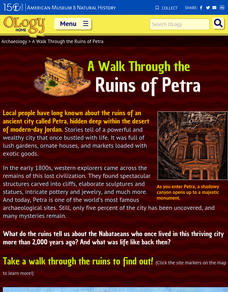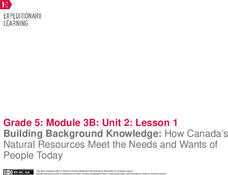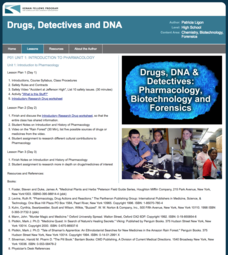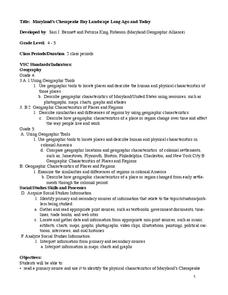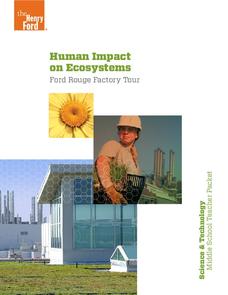American Museum of Natural History
A Walk Through the Ruins of Petra
Walking through the ancient Nabataean city of Petra can be a challenge. A tour begins with a 20-minute walk down a rocky slope through the narrow Siq to get to the famous Treasury known to Indiana Jones fans. But that is just the...
PBS
Stories of Painkiller Addiction: Contemplating Nature vs. Nurture
Does having an addict in your family make it more likely to become one yourself? Explore the genetic risk factors, as well as the prominent environmental influences, for substance addiction in a instructional activity that encourages...
EngageNY
Building Background Knowledge: How Canada’s Natural Resources Meet the Needs and Wants of People Today
Learners follow along as the teacher reads Products of Mining in Canada: From Batteries to Vehicles aloud. They then discuss the meaning of key terms and determine the gist of the text. Pupils do a second read and complete a graphic...
Global Oneness Project
The Value of Ancient Traditions
Imagine having to give up cell phones, computers, and TV? What would be lost? What gained? An examination of the Drokpa, a nomadic people who live in the grasslands of Tibet, provides class members an opportunity to consider how access...
Scholastic
Perfect Postcards: Illinois
Connect the geography and history of Illinois using an art-centered lesson on the railroads. The railroad connected once-distant places, particularly in the Midwest. Using research, class members create postcards of fictional cross-state...
American Museum of Natural History
All About Cloning
Start seeing double. The American Museum of Natural History website provides pupils with information about Dolly, the cloned sheep. Learners find out the procedure used to create Dolly along with why scientists clone animals.
American Museum of Natural History
A Whale of a Tale
What's the most interesting fact about a blue whale? Learners read an interview about the similarities between the Titanosaur and the blue whale displays at the American Museum of Natural History. Pupils learn not only about blue whales...
American Museum of Natural History
Field Trip Mars
Fly around the Martian surface. Pupils view a presentation on the planet Mars featuring a flyover that shows different views of the surface where rovers have landed and explored on different missions. As individuals watch the images, the...
American Museum of Natural History
Ask a Scientist About Our Environment
Let's ask an expert! Scientists at the American Museum of Natural History field questions about the environment in an interactive resource. Question topics range from global warming and conservation to endangered species and habitats.
Cyberwise
Good Digital Citizenship Outdoors
It's easy to miss the beauty of nature when one's focus is on technology. Don't make that mistake with help from a two-page reference sheet that provides eight tips for staying present when exploring the world around you.
Kenan Fellows
Unit 1: Introduction to Pharmacology
Learn about the study of medications, including those found in nature and those made synthetically. The first of four lessons in a series on pharmacology includes lectures, hands-on experiments, research, and more.
Annenberg Foundation
Teaching Geography: Workshop 4—North Africa/Southwest Asia
Can Jerusalem be equitably organized? Can Israel and Palestine be successfully partitioned? Part one of a two-part workshop looks at the geo-political history of Jerusalem while Part two investigates Egypt's dependence of the Nile River...
Curated OER
Maryland’s Chesapeake Bay Landscape Long Ago and Today
Combine a fantastic review of primary source analysis with a study of Captain John Smith's influence on the Chesapeake Bay region in the seventeenth century. Your young historians will use images, a primary source excerpt, and maps...
National Museum of the American Indian
The Kwakwaka'Wakw: A Study of a North Pacific Coast People and the Potlatch
Discover the cultural practices and unique value systems of a group of native peoples from Canada called the Kwakwaka'wakw. Your young historians will discuss how conceptions of wealth can vary and how these native people utilized...
Elizabeth Murray Project
The Education of Women in Colonial America
What educational opportunities were available to women during the colonial era in American history? How did the opportunities available to women differ from those for men? To answer this question, class members examine a series of...
Curated OER
Pocumtucks in Deerfield
As part of a study of colonial and Native American history, class members focus on the beliefs and land use of the Pocumtucks, who settled near Deerfield, Massachusetts. Students examine their beliefs about land use and ownership, the...
Facts and Files
The Nile
While it may not be possible to take an entire class to Egypt and explore the ancient wonders, it is possible to engage your young historians in activities that ask them to research these and other antiquities and place them on their...
Henry Ford Museum
Human Impact on Ecosystems
An environmenta science unit includes three lessons plus a cumulative project covering the ecosystem. Scholars follow the history of the Ford Rouge Factory from its construction on wetlands and how it destroyed the environment to its...
Core Knowledge Foundation
Unit 8: Native Americans
Over five weeks, fifth graders listen to and discuss reading passages that explore the connection between Native Americans and nature. Following daily readings, scholars practice word work, including prefixes, root words, suffixes,...
Macmillan Education
Webquest: Thanksgiving
Class members use the Internet to research the history of Thanksgiving in the United States and Canada, as well as the traditions surrounding the Thanksgiving-style celebrations of the Hebrews, the Chinese, and in Ancient Greece and Rome.
Wildwood Trust
Habitats
The circle of life is all around us, from the black bears in the nearby mountains to the pile of dead leaves in the backyard. Encourage young scientists to take a critical look at the world around them with a set of lessons about natural...
Urbana School District
Magnetism
The compass was first used in 206 B.C., but we didn't discover magnetic poles until 1263 A.D. Presentation begins with the history of magnetism before continuing on to magnetic fields, magnetic forces, electromagnets, currents,...
State Bar of Texas
Gibbons v. Ogden
Have you ever played the game Monopoly? Do you know what it takes to win the game correctly? Scholars research the nature of outlawing monopolies in the United States while controlling trade. They investigate the court case Gibbons v....
Texas State Energy Conservation Office
Global Climate Change
Here is an extensive reading resource that addresses our climate change crisis. It thoroughly explains the greenhouse effect, related Earth cycles, and the history of climate change. Use it as part of the intended unit, published by the...
Other popular searches
- Museum of Natural History
- Australia Natural History
- Natural History Writers
- Natural History of Hawaii
- Natural History Museums
- Australian Natural History
- Natural History Yosemite
- Ancient Natural World


